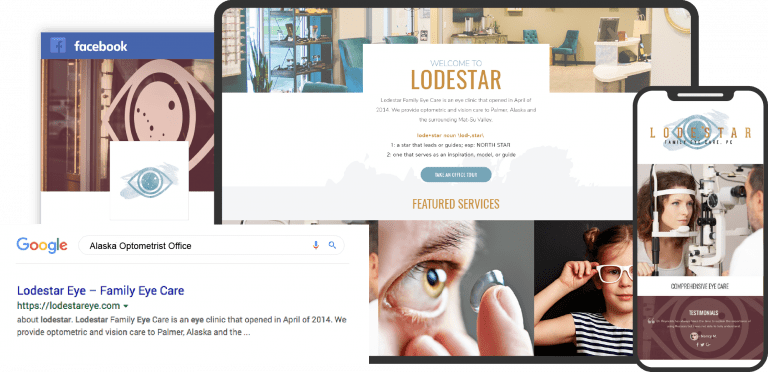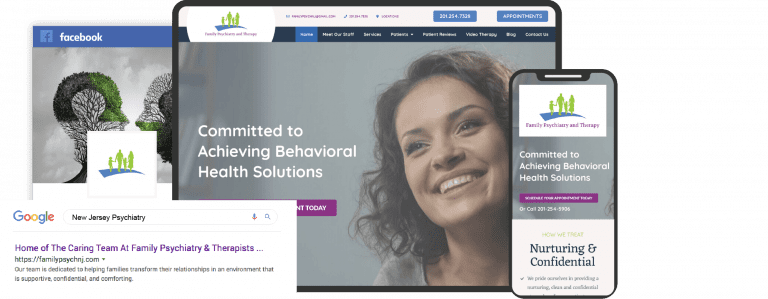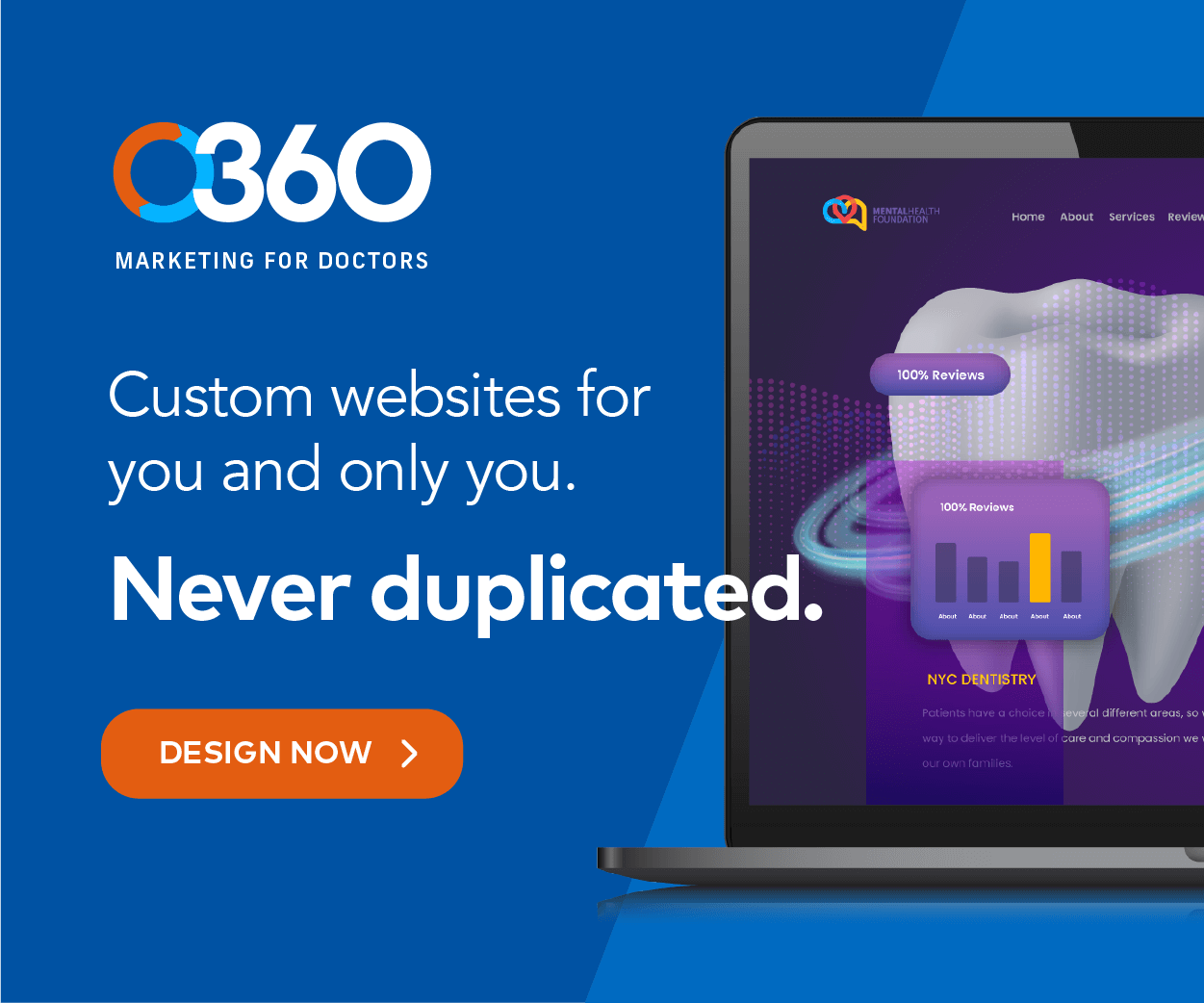Designing an empathetic therapy website faces several unique challenges during the earliest phases. They must reflect the clinic’s culture, highlight its services, and, most importantly, display empathy and compassion for their patients. Those seeking mental health care are often struggling with conditions that leave them feeling judged and vulnerable. Helping them choose you for your care requires understanding this and showing empathy in your SEO strategy and site design. Our mental health website design team brings their expertise and understanding to integrating these concepts at every stage.

Empathetic SEO Strategies in Mental Health Website Design
Search Engine Optimization is helping your empathetic therapy website reach your patients by appearing in their search results. This process is central to marketing for every business, and each business requires an approach tailored to its audience. In the case of SEO for therapy websites, empathy is a core theme. Compassion must be central to your strategy, from the meta-description under search results to the keywords you select.
When implemented successfully, empathy-focused SEO can significantly influence your patient experience. Over 70% of all potential patients seeking care do so through the Internet first. They’ll research local providers, visit their sites, and explore reviews, including on third-party sites. These potential patients represent some of the most discerning regarding their care. Perhaps more than any other type of care, therapy requires a connection between patient and provider.
An effective empathy-based SEO strategy helps build a connection with patients before they visit your site. Building this trust early is essential in helping these patients find and choose you to provide the care they need.
Effective Key SEO Strategies for Therapy Websites
We will explore some elements of successful SEO strategies that balance effectiveness with empathetic therapy website design. These elements will help attract new visitors and provide an experience that will turn them into new patients.
Targeted Keyword Integration
Keywords are the keystone of any effective SEO strategy. Any successful marketing campaign requires selecting keywords that match your patient’s concerns. When used correctly, they’ll help your audience find you and encourage them to learn more about your services.
Tips for Effective Keyword Integration:
- Reference common concerns that those with mental health concerns face. “Therapist near me,” “Family Counseling,” and “Trauma Therapy” are examples.
- Long-tail keywords are typically commonly used phrases and are an opportunity to highlight your practice. Examples include “Nonjudgmental depression therapist,” “open-minded couples counseling,” and “LGBTQ+ friendly mental health services.”
- Integrating keywords into your headings and sub-headings is an effective technique. The full text of these entries should use empathy-signaling words. “Compassionate Depression Therapy Services” is an example.
- Keyword integration is also important in less visible parts of your empathetic therapy website. Title tags, meta descriptions, and even alt-text for images are good places to include them.
High-Quality, Empathetic Content
With so much emphasis on the effective use of keywords, it’s easy to lose sight of the importance of content. The written content on your empathetic therapy website must incorporate these keywords, but it also needs to stand on its right. It should be informative, easy to understand, and match the message you want to bring to your readers. Creating an empathetic therapy website requires content that soothes the patient’s worries and encourages them to seek treatment.
Content Ideas for Therapy Websites:
- Blog content that focuses on your patients’ mental health concerns.
- Guides and tips for managing aware, effective, and practical symptoms.
- Highlight treatment types, approaches, and questions to ask your therapy.
- Videos, downloadable materials, and guides can be valuable resources for readers.
- “Meet The Staff” sections that highlight the qualifications, histories, and philosophies of your care providers.
The content you provide should be sensitive to your audience’s struggles. It’s important to focus on inclusivity and cultural concerns. By choosing topics that align with the reality those you serve face, you’ll deepen the connection and build trust.

Optimize for Local SEO
Local SEO is the practice of ensuring your empathetic therapy website marketing reaches specific regions or communities. It’s common for providers to run multiple SEO campaigns at once, each targeting specific and sometimes overlapping communities. Geo-fencing means you can target specific events and build campaigns for different communities and your competitor’s business. Local SEO is vital to an effective campaign for mental health providers, as prospective patients tend to focus their search locally.
Local SEO Best Practices:
- Optimize your profile on Google My Business with accurate contact details and office hours.
- Include your city or neighborhood in website content and metadata.
- Promote happy clients to leave reviews on platforms like Google and Yelp.
- Use schema markup to deliver locational details to search engines.
Another important tool for effective local SEO is partnering up with community resources. By collaborating with healthcare providers and local schools, you can increase the visibility of your care center. This shows your participation in the community and grounds you as part of the local area.
Build For Mobile-Responsive Design
Over 70% of website traffic is sourced from mobile devices, making mobile responsiveness an important element of any empathetic therapy website design. An additional consideration makes it even more critical for those providing mental health services. Those seeking mental health care will often do so from their phone due to the privacy it provides. The small screen size and portable nature of these devices make it possible to research mental health topics and providers without being observed. While the stigma around mental health is in decline, this privacy is still important to many people seeking care.
Features of Mobile Optimization:
- Fast loading speeds for mobile users through image optimization.
- Streamlined navigation, including hamburger menus and return-to-top functionality.
- Mobile-friendly features such as click-to-dial and click-to-navigate.
To be considered complete, mobile-friendly designs need to incorporate accessibility features. Larger fonts, high-contrast backgrounds, and touch-friendly navigation are essential for disabled visitors.
Accessibility Elevates Empathetic Therapy Website Design
Accessibility options are required by the ADA (Americans with Disabilities Act) and adhere to WCAG (Web Content Accessibility Guidelines), but they also benefit empathetic therapy website design. Mental health concerns take many forms, and some of them can impact how sufferers process information. A website designed with accessibility in mind takes these into account to reduce the barriers to care. Additionally, accessibility impacts ranking as search engines are trained to recognize and prioritize user-friendly sites.
Accessibility Features to Include:
- Provide alt text for images in support of screen readers.
- Use descriptive link text (e.g., “Learn more about anxiety therapy” instead of “Click here”).
- Ensure your website’s color contrast is sufficient for visually impaired users.
- Include captions or transcripts for video content.
If you live in a diverse community with multilingual groups, your site should also provide multilingual options to improve accessibility. Maintaining an accessible site is an ongoing task, so review your site regularly to ensure compliance with the ADA.

Reach Your Audience with Mindful Social Media Integration
Social media platforms are outstanding places to promote your practice and educate the public. Providing up-to-date information about mental health issues is a great way to build trust. Not only does it ensure that the most recent data is available, but it also communicates the progressive nature of your clinic. Potential patients will see your public education efforts and know you’re in their fight with them. Further, it can reach those unfamiliar with the topic and help guide them toward receiving care if needed.
Best Practices for Social Media:
- Share blog posts and resources to direct users to your website.
- Engage with your followers by commenting and direct messages.
- Use hashtags to increase the visibility of your posts.
- Host live Q&A sessions or webinars on mental health topics.
Effectively using of social media platforms can help improve visibility for mental health and your clinic. Regularly posting relevant information builds your audience’s reliance on you as a source of educational resources. This promotes sharing your content and the direct referral of those who need care to your clinic.
Experience the Power Of Empathetic Therapy Website Design
Running a mental health practice comes with immense responsibility and accountability to your community. Every day, you promote mental health awareness and provide educational materials for those seeking to learn more. Most importantly, you provide the guidance and support your patients need to overcome their struggles and live with them successfully.
Your website is a central component of all these elements, but it’s a multilayered process. It must connect with your patients and provide important resources and functionality effectively and reliably. This is why you should leave your therapy website design to the professionals at Optimized 360. Our team has immense experience creating websites that reflect the passion and empathy of mental health providers. Contact us today to create a beautifully designed website that provides your clinic and its community with the needed services.













